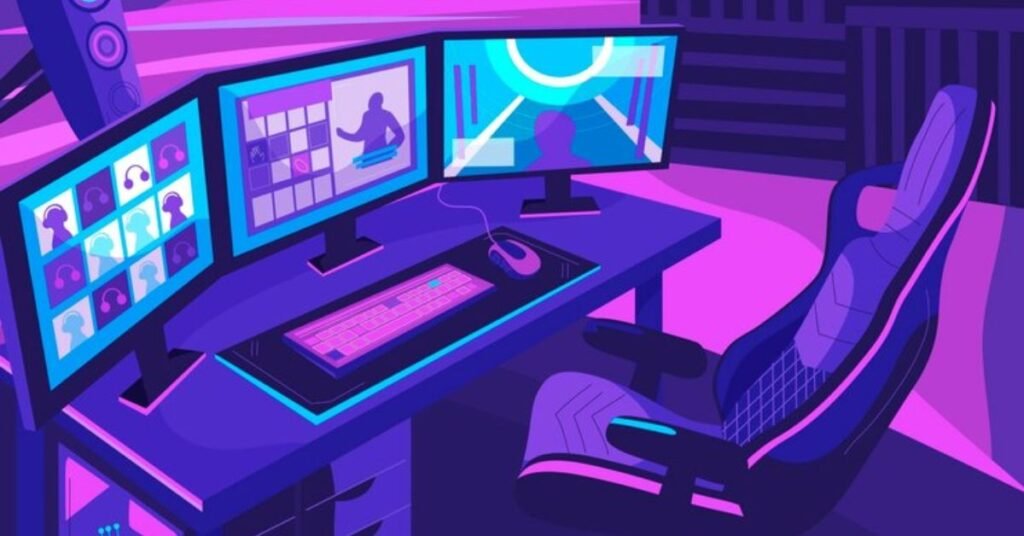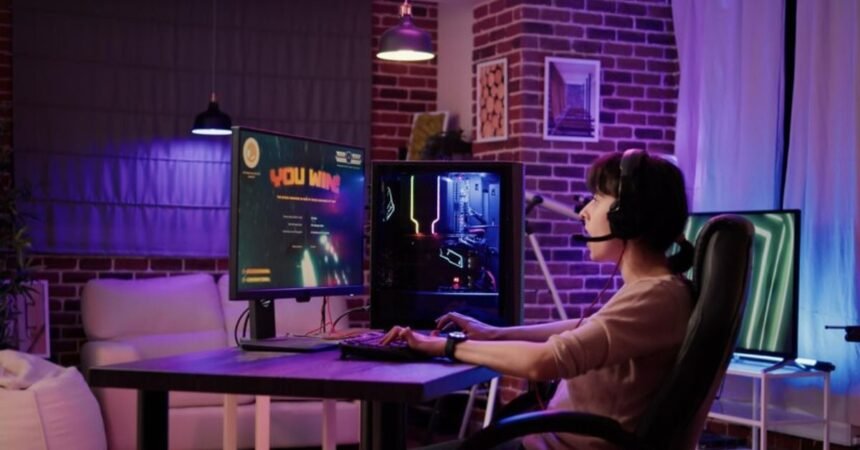Introduction
PC gaming has become a massive industry, captivating millions of gamers worldwide with its superior graphics, performance, and flexibility. Whether you’re a casual player or a competitive esports enthusiast, the world of PC gaming offers an immersive experience like no other. With advancements in technology, gaming PCs provide cutting-edge performance that consoles and other devices often struggle to match.
In this comprehensive guide, we will delve into the core concepts of PC gaming, explore its benefits, examine practical use cases, and discuss the challenges associated with it. Whether you’re just starting out or considering an upgrade, this article will help you understand everything you need to know about playing video games.
What is PC Gaming?
PC gaming refers to the use of personal computers for playing video games. Unlike gaming consoles, a PC can be upgraded, customized, and optimized to meet specific performance needs. PC gamers use desktops or gaming laptops equipped with powerful hardware, such as high-performance processors, GPUs (graphics processing units), and advanced cooling systems.
Key Concepts of PC Gaming
- Gaming PC Components: High-performance hardware such as CPUs, GPUs, RAM, and storage devices designed for smooth gameplay.
- Graphics and Performance: PCs offer superior graphics, higher resolutions, and better frame rates than most gaming consoles.
- Customization: PCs allow for greater customization, from hardware upgrades to software settings and even game mods.
- Steam and Other Platforms: Most PC gamers use platforms like Steam, Epic Games, or GOG to access and purchase games digitally.
playing video games flexibility allows players to adjust game settings, use various input devices, and even create mods to personalize their gaming experience.
Importance and Benefits of PC Gaming
PC gaming offers a wide range of advantages, making it a popular choice for both casual and professional gamers. Below are some of the key benefits of playing video games.
1. Superior Graphics and Performance
One of the main reasons many gamers prefer PC gaming is the superior graphics and performance. Gaming PCs are capable of running games at higher resolutions, including 4K, and can handle higher frame rates (FPS), ensuring a smoother and more immersive experience. Players can adjust the settings to prioritize either visual quality or performance, depending on their preferences.
2. Customization and Upgradability
Unlike gaming consoles, where hardware is fixed, PCs allow users to upgrade components such as the CPU, GPU, or RAM. This flexibility ensures that your gaming rig can stay up to date with the latest gaming technology without needing to buy a whole new system.
3. Game Variety and Exclusivity
PC gaming offers access to a vast library of games, many of which are either exclusive to PC or first released on PC. Additionally, PC gamers can enjoy indie titles, early access games, and exclusive mods that aren’t available on consoles.
4. Modding Capabilities
One of the most attractive aspects of playing video games is the ability to use mods, which are user-created content that can alter or enhance games. Mods can range from simple cosmetic changes to complete game overhauls, offering a level of customization that is rarely seen on other platforms.
5. Competitive Esports
Many of the world’s biggest esports titles, such as League of Legends, Dota 2, and Counter-Strike: Global Offensive, are primarily played on PCs. The precision offered by a mouse and keyboard makes PC gaming the go-to platform for competitive play.
6. Cost-Effectiveness Over Time
While the initial cost of a gaming PC can be high, its long-term value often exceeds that of consoles. This is because you can upgrade individual components as needed, rather than replacing the entire system. Additionally, games on PC often go on sale, and platforms like Steam offer discounts that can save gamers a significant amount over time.
7. Enhanced Multitasking
PCs can handle more than just gaming. Whether you want to stream gameplay, record videos, or multitask by browsing the web or editing content while gaming, a gaming PC offers more versatility than consoles or mobile devices.
Key Components of a Gaming PC
Understanding the essential components of a gaming PC is crucial for both building and upgrading your setup. Below, we discuss the critical hardware components that affect gaming performance.
1. Central Processing Unit (CPU)
The CPU is the brain of your PC, responsible for processing instructions and managing system tasks. For gaming, a CPU with high clock speeds and multiple cores is essential, as modern games require significant processing power.
2. Graphics Processing Unit (GPU)
The GPU handles rendering graphics in games. A high-performance GPU is critical for achieving smooth gameplay, especially at higher resolutions and with more detailed textures. Leading brands like NVIDIA and AMD produce GPUs that support ray tracing and advanced visual effects.
3. Random Access Memory (RAM)
RAM affects how efficiently your system handles multiple tasks. For gaming, 16GB is recommended, although 8GB can be sufficient for less demanding titles. More RAM allows smoother gameplay and multitasking.
4. Storage (HDD/SSD)
Solid State Drives (SSDs) provide faster load times compared to traditional Hard Disk Drives (HDDs). Many gamers opt for SSDs to store games, resulting in quicker startup times and reduced lag in-game.
5. Power Supply Unit (PSU)
A reliable PSU is necessary to power your system and ensure stability. The wattage required depends on your other components, especially the GPU and CPU.
6. Cooling Systems
High-performance gaming components generate significant heat, which requires proper cooling. Many gaming PCs include fans, heatsinks, or even liquid cooling systems to maintain optimal performance and prevent overheating.
7. Peripherals
PC gaming peripherals include keyboards, mice, and monitors designed specifically for gaming. Mechanical keyboards, gaming mice with customizable DPI settings, and high-refresh-rate monitors (144Hz or higher) can enhance the gaming experience significantly.
Applications and Use Cases of PC Gaming
PC gaming goes beyond just playing video games for fun. It has practical applications in several industries, as well as within the gaming community itself.
1. Esports and Competitive Gaming
PC gaming is the foundation of competitive esports. Titles like Fortnite, Overwatch, and Valorant are played at high levels, with many players competing professionally. High-performance gaming PCs ensure that competitors can perform without lag or hardware limitations.
2. Game Development
Many developers use PCs for creating games, as the platform allows for complex coding, testing, and designing. Developers can easily test their creations on the same platform they build them on, speeding up the development cycle.
3. Streaming and Content Creation
PC gaming is ideal for content creators who stream gameplay or upload videos to platforms like Twitch and YouTube. Powerful PCs allow creators to run games while simultaneously streaming or recording high-quality video.
4. Virtual Reality (VR)
Many of the best VR experiences are exclusive to PC. With advanced GPUs, PCs can handle the demanding graphics and processing power required for VR headsets like the Oculus Rift and HTC Vive. This allows for immersive gaming experiences that are unmatched by consoles.
5. Modding Communities
PC gamers actively participate in modding communities, where they create, share, and install game modifications. These communities enhance gameplay by offering new levels, characters, or mechanics, contributing to the longevity of popular games.
6. Educational and Professional Use
PC gaming isn’t just for entertainment. Games like Minecraft are used in educational settings to teach creativity, teamwork, and problem-solving. Meanwhile, simulators such as Flight Simulator are used for professional training in industries like aviation.

Challenges and Solutions in PC Gaming
While playing video games has numerous benefits, it also comes with its own set of challenges. Below are some common issues that gamers face and possible solutions.
1. High Initial Costs
One of the most significant barriers to PC gaming is the high initial cost of purchasing or building a gaming rig. High-end components like GPUs and CPUs can be expensive.
Solution:
Start with a budget-friendly build and upgrade over time. Many gamers find that a mid-range PC can handle most games, with the option to upgrade individual components as needed.
2. Hardware Compatibility
With so many components available, it can be challenging to ensure that all parts of a gaming PC are compatible with each other.
Solution:
Use online resources like PCPartPicker to verify that your selected components work together. It’s also advisable to research gaming forums and guides for building a compatible setup.
3. Maintenance and Upkeep
Unlike consoles, PCs require regular maintenance. Dust buildup, software updates, and driver installations are necessary to keep a gaming PC in optimal condition.
Solution:
Create a routine maintenance schedule for cleaning hardware and updating software. Dust filters, compressed air cans, and regular check-ups can help prolong the life of your components.
4. Game Optimization
Not all games are optimized equally for PC, which can lead to performance issues even with high-end hardware.
Solution:
Adjust in-game settings for optimal performance. Many games have settings for resolution, shadows, texture quality, and anti-aliasing that can be adjusted to find the right balance between performance and visuals.
5. Cybersecurity Threats
Online gaming on PCs opens players to potential security risks, such as malware, phishing, or hacking attempts.
Solution:
Use antivirus software, enable two-factor authentication on gaming platforms, and avoid downloading games or mods from untrustworthy sources. Staying vigilant helps protect both your system and personal data.
Conclusion
PC gaming offers a level of performance, customization, and flexibility that consoles and other platforms can’t match. From superior graphics and frame rates to modding capabilities and esports dominance, PC gaming continues to grow in popularity for gamers of all skill levels. While the initial investment might be higher than consoles, the long-term benefits, such as upgradability and a massive game library, make it a worthwhile investment.
Whether you’re a casual gamer or a competitive player, building or upgrading a gaming PC can elevate your experience to new heights. Start with the basics, explore the vast world of playing video games, and enjoy endless hours of immersive, high-quality gameplay.
FAQs
1. Is PC gaming better than console gaming?
PC gaming offers superior graphics, more customization, and access to a wider variety of games. However, consoles may be more affordable and accessible for some users.
2. What is the best budget for a gaming PC?
A budget of around $800 to $1,200 can get you a solid mid-range gaming PC that can handle most games.
3. Can I upgrade my gaming PC over time?
Yes, one of the major advantages of PC gaming is that you can upgrade individual components as needed, such as the GPU or CPU.
4. Do I need a high-refresh-rate monitor for PC gaming?
A high-refresh-rate monitor (144Hz or above) improves the smoothness of gameplay, especially in fast-paced games, but is not a necessity for all types of gaming.
5. Is PC gaming more expensive than console gaming?
PC gaming can have a higher initial cost due to hardware, but long-term costs can be lower thanks to regular sales, free-to-play titles, and hardware upgrades instead of full system replacements.




